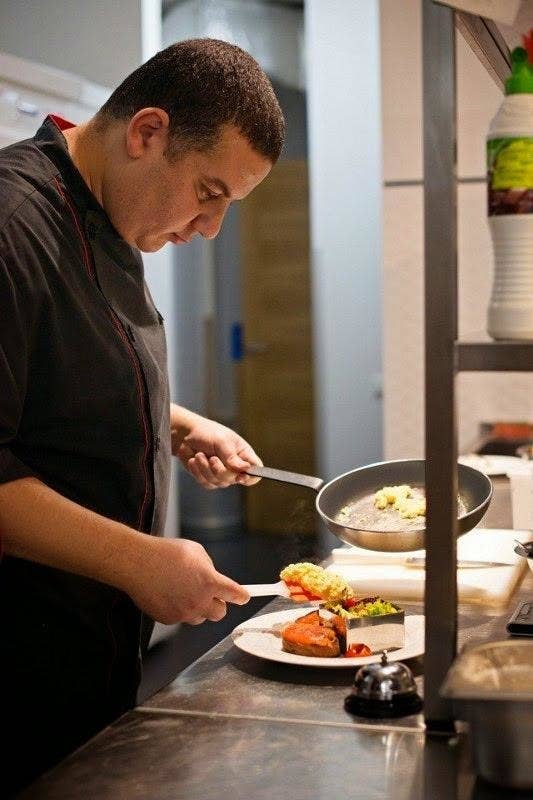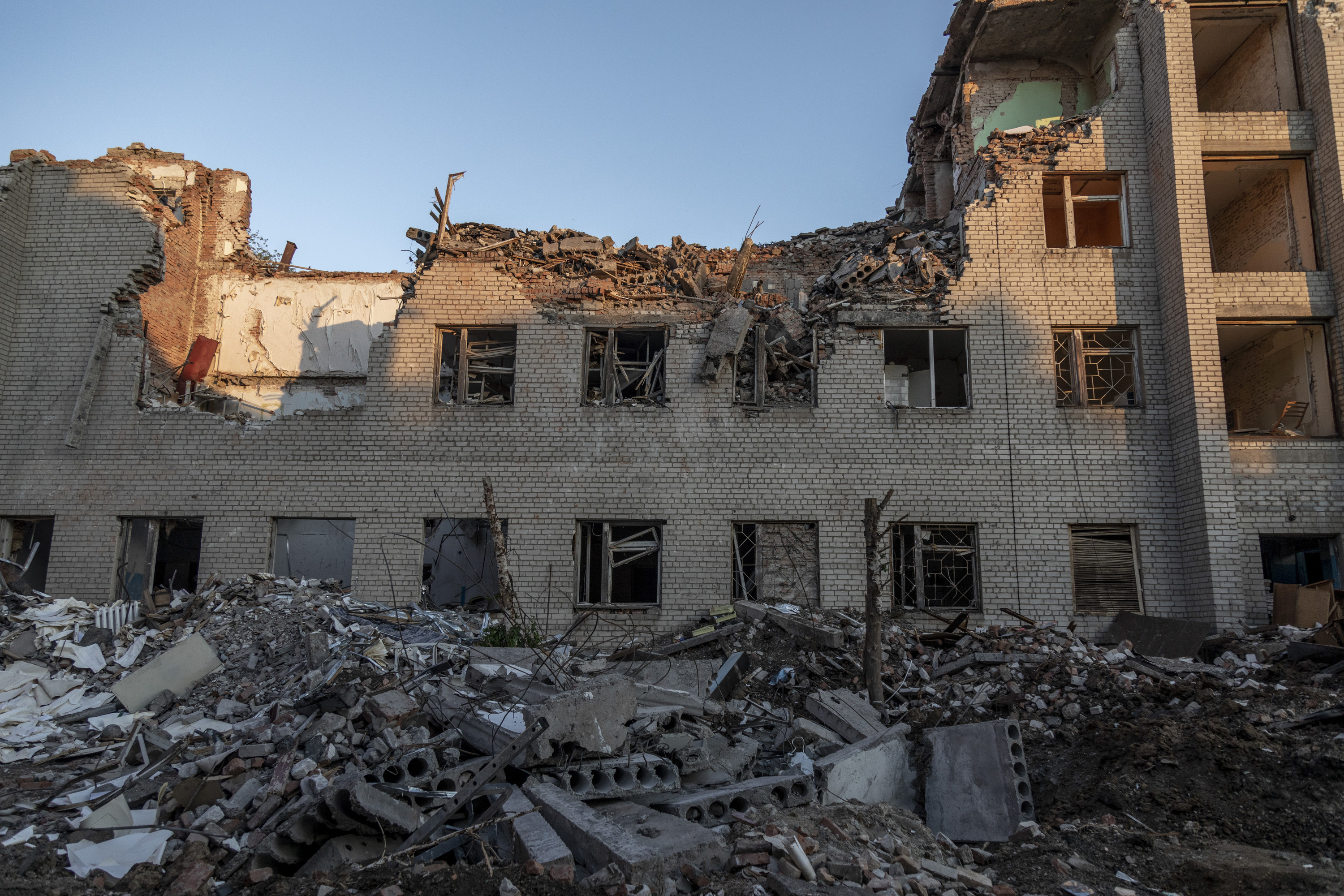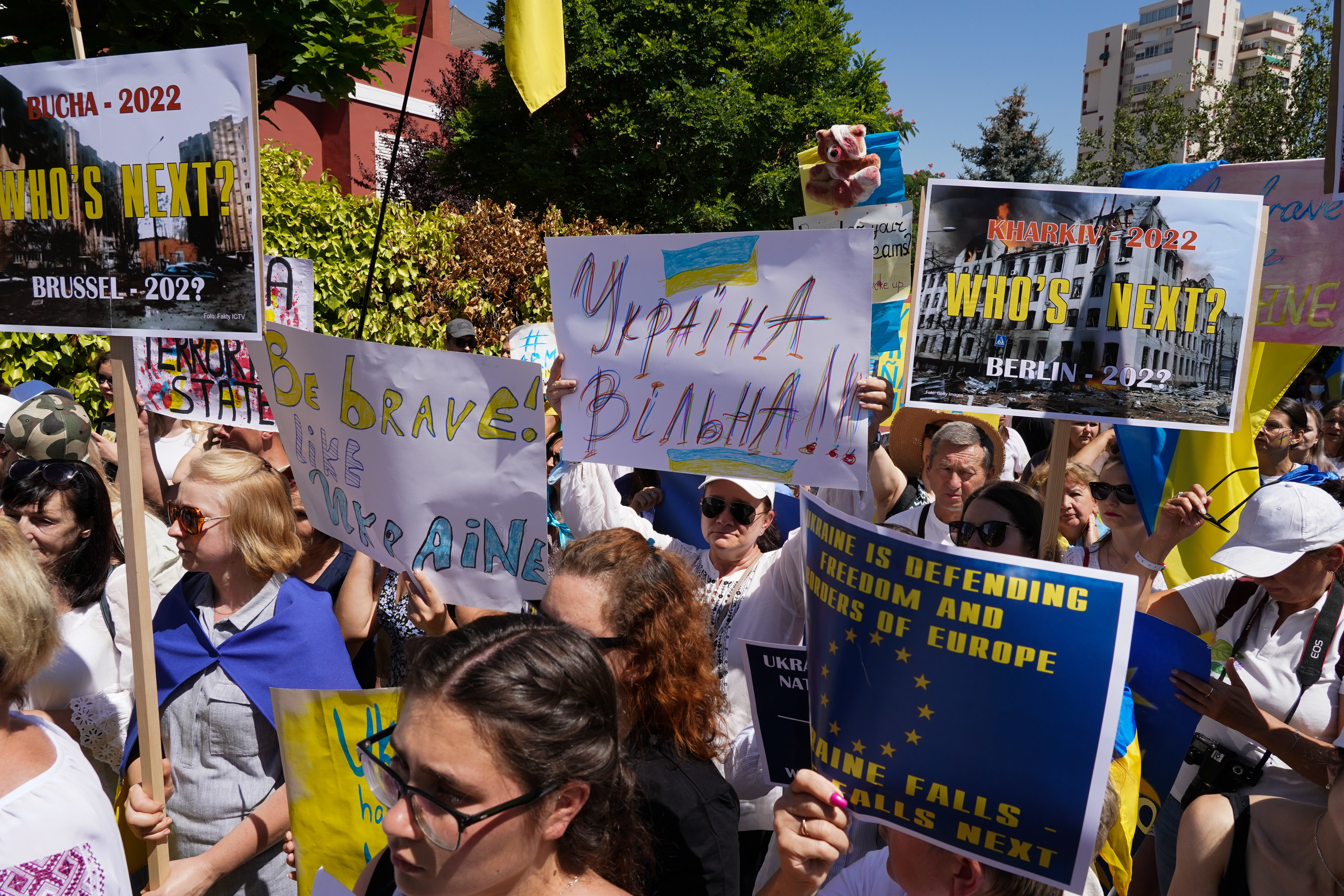
After escaping the war in Ukraine, 43-year-old chef Hass thought he was lucky to find a job in a nice restaurant in Alicante, Spain. It had comfy wicker armchairs and overlooked the Mediterranean Sea. It offered a menu of colorful seafood, paella, and tapas. It seemed, at first, like a perfect landing spot.
But he was soon surprised by the working conditions he encountered. His boss told him he would have to work six days a week, his shifts would often be longer than eight hours, and he would receive no vacation time — all for a minimum wage that amounted to 1,100 euros a month. He calculated that it would not be enough to take care of his wife and daughter, he said.
His time on emergency assistance was dwindling. He had already used four months of the one-year time period of temporary protection that Ukrainians are given in Spain, which is double the time that other refugees have. During this time period, they are provided housing and food but no financial assistance. Hass needed financial security before his benefits expired. Stuck in a 12-hour-a-day job, he’d have no time to look for another one, so he decided to quit on day one and find work elsewhere before it was too late.
“In Spain, people think Ukrainians work for less,” said Hass, who requested he be referred to by a nickname to preserve his future job prospects and personal safety. “We want to work only in good conditions.”
Amid a global labor shortage, Spanish business owners and regional elected officials hoped Ukrainian refugees would fill critical roles in hospitality industries to help jump-start its tourist economy. Spain largely depends on seasonal tourism, which has ground to a halt over the first two years of the pandemic. Now, a country of 57 million residents is hoping to draw back the 85 million tourists it saw annually before COVID-19 shut down international travel. The economy needs at least 100,000 new workers, half of them in the hospitality sector. Coincidentally, over 120,000 Ukrainians have sought refuge in Spain as of mid-June 2022.
But those plans have stalled as newly arriving Ukrainians are subjected to the difficult working conditions, including long hours and short-term contracts, that faced many migrants before them, particularly those from African countries. Now under the spotlight of a war that continues to rage in Ukraine, Spain’s labor and immigration advocates allege that business owners and local politicians have merely recast predatory work arrangements as alluring opportunities in times of crisis.
Things were supposed to be different. Earlier this year, Spain passed a law that banned certain types of temporary work contracts, ostensibly paving the way for those in service industries like Hass’s to access benefits like paid vacation and access to unemployment benefits after the contract ends. The government and local NGOs have offered free job training courses in food handling, janitorial work, and food service. But the work that students are eligible for after receiving this publicly funded education usually doesn’t meet the legal requirements. In Spain, the workweek is 40 hours, and the mandatory weekly rest period is two days; each month worked generates two days of vacation — terms Hass said he was excluded from.
Conditions are so bad that there's a concern people will return to the war-torn country and put themselves in physical danger, a dozen social workers and advocates told BuzzFeed News. A third of the Ukrainians who left the country since the war started in February has already returned, according to the European Border and Coast Guard Agency.
Only 6.5% of Ukrainian refugees who came to Spain since February have entered the labor force as of July, according to Spain’s official figures, but they are still highly sought after because they’re educated; 61% have university degrees — and, unlike many other migrants in recent years, they are white, though advocates and public officials rarely publicly mention the role of racism, five social workers said.
Spain's openness to Ukrainian refugees contrasts with efforts from the European Union to keep out refugee-seekers in neighboring African countries. In June, 37 migrants died when a group of 2,000 people tried to jump the high-security fence that secures the Spanish enclave of Melilla in North Africa. Video footage showed Moroccan agents beating the migrants; Spain thanked them for their effective response.
The contrast between how Spanish authorities treat African and Ukrainian refugees is stark. Ukrainian workers "raise less rejection and less distrust than other nationalities," said Mercedes Ena, coordinator of the Spanish Commission for Refugee Aid in the Valencian community. “The cultural patterns are much more similar,” she said.

This isn’t the first time Hass has escaped war. In 2014, Russian troops invaded the eastern region of Ukraine, where his family lived. More than 13,000 people were killed, 28,000 were wounded, and 1.8 million residents of Crimea and Donbas were displaced, according to the Office of the United Nations High Commissioner for Human Rights. They moved to Kyiv, not knowing they’d be displaced less than a decade later.
“We lost everything then, and now for a second time,” Hass said.
On Feb. 24, 2022, at 5 p.m., he heard the first two bombshells crashing at the nearby airport. He rushed to put his wife, their 13-year-old daughter, and their dog in the car. They spent that first night in an underground parking lot, the closest thing to a bomb shelter they could think of.
At dawn, he got a call from a neighbor who worked at the Security Service of Ukraine. He told Hass to leave Kyiv immediately. They ran to the apartment, grabbed what they could, and left.
He drove his car across the border to Romania. That was the one and only time they were asked for documents, he told BuzzFeed News. Then they made it to Hungary, Italy, France, and, finally, Spain. In total, he drove 3,000 miles from Kyiv to Alicante.
Through a network of volunteers along the way, they were told to go to the town’s railway station. From there, the Spanish Red Cross placed them in temporary housing: a nice, clean studio they could share with their dog.
The Red Cross has assisted 90,130 Ukrainians upon their arrival in Spain, 2 of every 3 newcomers, according to the organization’s data.
Asylum-seekers from Ukraine now get a one-year temporary protection status as soon as they register their arrival in Spain. From day one, they can work and the permit is extendable for another year, yet only 18% of applicants are successfully granted asylum after two years, according to Red Cross data from before the Russian invasion of Ukraine.
Hass is an outlier among refugees. Sixty-five percent of Ukrainians arriving are women, and 34% are minors. He managed to flee just before men were prohibited from exiting the country and drafted into the military, arriving in Spain on March 17.
His daughter, who loves drawing and roller-skating and used to take classes at a dance studio in Kyiv, now goes to school in Alicante, where she has made new friends. “But the problem is that we don’t know what will happen tomorrow,” her father said. “She is afraid to lose friends again and start all over again.”
Psychologists and social workers argue that it is too early for refugees who recently endured trauma to be looking for jobs in the immediate aftermath. "They are in absolute shock. They can't think about the future beyond a month," sadi Antonia Jiménez Milla, coordinator of the employment program for applicants and beneficiaries of Temporary International Protection at the Spanish Red Cross.

When the Russian invasion of Ukraine started, Spain took a leading role in the humanitarian crisis, committing to hosting 12,000 refugees annually. In the first four months of the war, the Spanish Committee for the UN High Commissioner for Refugees raised 23 million euros from private donors.
In April, as the arrival of Ukrainian refugees peaked, Spain, in an effort to boost economic recovery after COVID shutdowns, passed a law that limits temporary contracts for workers.
The change affected hotels and restaurants, many of which continue to look for loopholes. Now, they offer permanent contracts, such as the one Hass signed, for a minimum salary. In some cases, the job also comes with an unwritten expectation that a worker clock in more hours than legally permissible.
The Spanish Parliament wants to help businesses find workers from other countries to end its labor shortage. Hostelería de España, the country’s largest hospitality conglomerate, which represents 315,000 establishments nationwide, recently announced an agreement with the Spanish Commission for Refugee Aid and the Red Cross to launch a first-of-its-kind online platform to list all of its job openings. But the agreement deadlocked as humanitarian nonprofits raise concerns about refugees being exploited at work. “Wages and contracts have to comply with the law; otherwise the worker has to denounce it,” Hostelería España told BuzzFeed News.
Some advocates worry that companies are trying to take advantage of refugees’ vulnerable situation since they have no savings, support net, or knowledge of their rights.
For Hass, filing an official complaint against the restaurant didn’t seem like a viable option. He knows his situation is fragile and fears hurting his job prospects elsewhere.
Abusive work situations are already fueling the return of Ukrainians to their home country, even if the war is far from ending, Hanna Vakhitova, Professor at the Kyiv School of Economics, said. “If the conditions are close to exploitation, then they will think twice about whether that makes sense.”
That is what is at stake for Hass now. He quit his job at the restaurant at the end of his first day. He doesn’t want to go back to Ukraine, but he needs to find a sustainable way to stay.
“Spain is beautiful, quiet, and calm, but for the moment it is hard,” he said. “If there’s no job, we will have to move.”
Correction: Spain's population is 57 million. That number was misstated in a previous version of this post.

